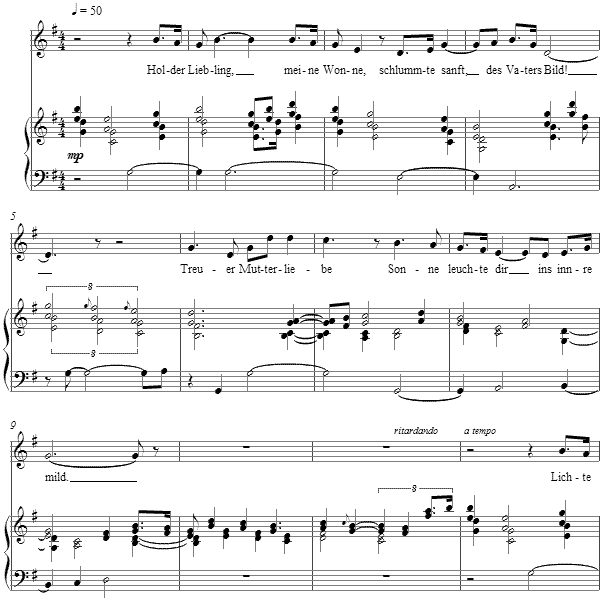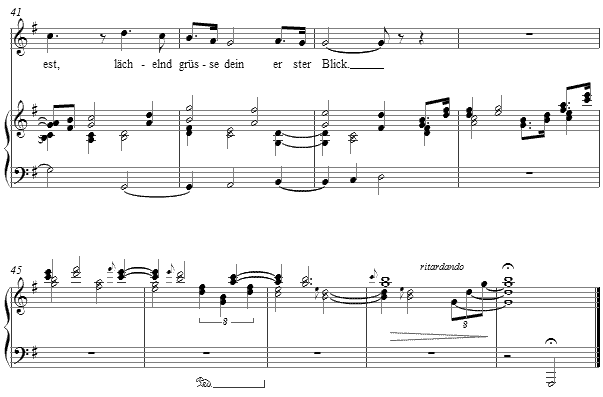Music and Texts of GARY BACHLUND
Vocal Music | Piano | Organ | Chamber Music | Orchestral | Articles and Commentary | Poems and Stories | Miscellany | FAQs
Wiegenlied - (2007)
Ludwig I
for medium voice and piano
Holder Liebling, meine Wonne,
schlummte sanft, des Vaters Bild!
Treuer Mutterliebe Sonne
Leuchte Dir ins Innre mild!
Lichte Engel stehn im Kreise,
deiner Wiege süsser Hort,
künden im Gesang Dir leise
eines Volkes Jubelwort.
Gleich der Rose wird entfalten
Deines Lebens Lenz sich Dir,
Deiner Träume friedlich Walten,
spiegle Deine Zukunft mir.
Schlummre, da Dir Kühlung fächelnd,
still die Mutter preist ihr Glück.
Und wenn Du erwachest,
lächelnd grüsse sie dein erster Blick.[ 3 pages, circa 4' 00" ]
Ludwig I
Ludwig I (1786–1868) was king of Bavaria from 1825, succeeding his father of the Wittelsbach family, until the 1848 revolutions in the German states. He might easily be referred to as Louis I of Bavaria, for the French form of his name was probably used by his godfather, Louis XVI of France. The royal families of Europe were in this time spread out among many pseudo-nationalities prior to the revolutions uniting groups of common people. During the revolutions of 1848 he abdicated on March 20, 1848 in favor of his son, Maximilian. His second son Otto had been elected king of Greece in 1832.
Ludwig's rule was tinged by an enthusiasm for the arts and women, including a number of high profile affairs. Ludwig patronized the arts and was an admirer of the arts of ancient Greece, the Italian renaissance and the German Middle Ages.
He reorganized the administrative regions of Bavaria in 1837 and re-introduced the older names of Upper Bavaria, Lower Bavaria, Franconia, Swabia, Upper Palatinate and Palatinate. Ludwig also encouraged Bavaria's industrialization, along with canals for commerce and the first German railway was constructed in his domain, between the cities of Fürth and Nuremberg. After the Revolution in France in 1830, he became more and more repressive, and the Hambacher Fest in 1832 showed the discontent of the population which suffered from both high taxes and censorship.
Ludwig had several love affairs and became tainted with scandals associated with another of his mistresses, Lola Montez, an Irish-born dancer and actress who became famous as an exotic dancer and courtesan. It seems likely that his relationship with her contributed greatly to the fall from grace of the previously popular king. After his abdication Ludwig remained an important sponsor for the arts.
Even so, he was ridiculed in various ways. Heinrich Heine called him the "unrhymed Bavarian king of the lapidary style." Heine contemptuously wrote in a consciously forced rhyme:
Herr Ludwig ist ein großer Poet,
Und singt er, so stürzt Apollo
Vor ihm auf die Knie und bittet und fleht:
"Halt ein! Ich werde sonst toll, o!"
Mister Ludwig is a great poet,
for when he sings, so does Apollo
fall on his knees before him and pleads:
"Stop! I wish it were I they extol - o!"
Even so, this little rhymed set of strophes is a sweet cradle song which moved me to set the words to music. At least we imagine Ludwig had some love for children, having fathered ten.
This delicate poem is set in its four strophes, with a short bridge growing a little longer and more complex with each strophe.
The ending of the setting is an echo of the bridges between the strophes.
The score is available as a free PDF download, though any major commercial performance or recording of the work is prohibited without prior arrangement with the composer. Click on the graphic below for this piano-vocal score.


